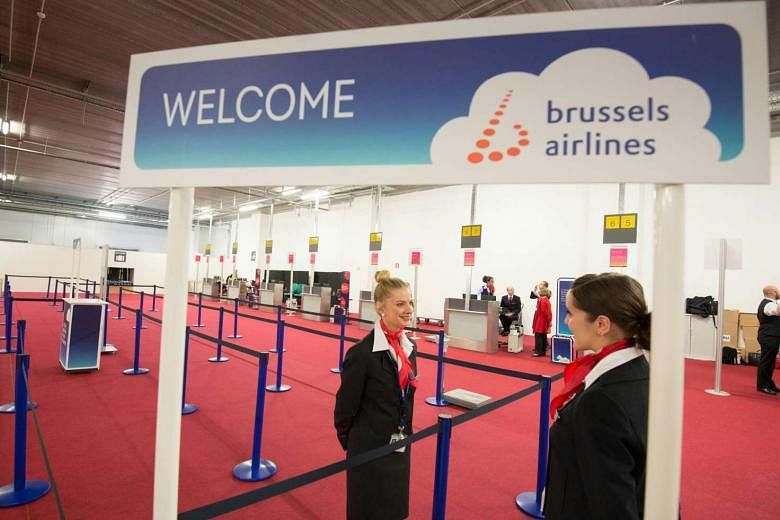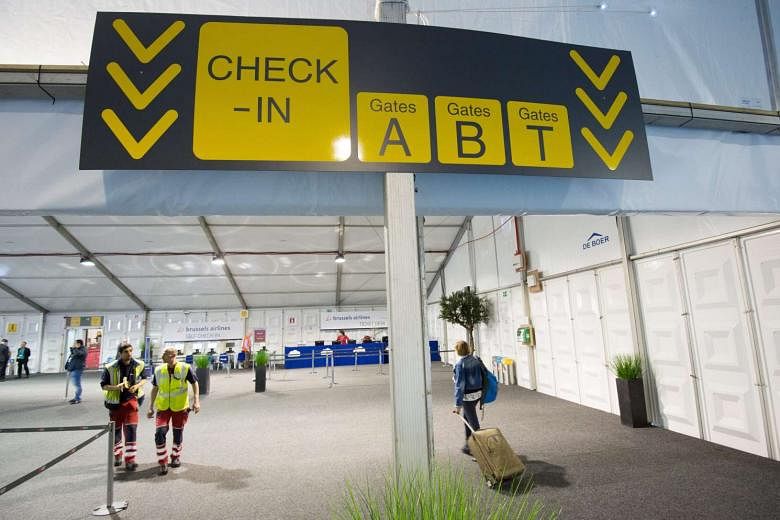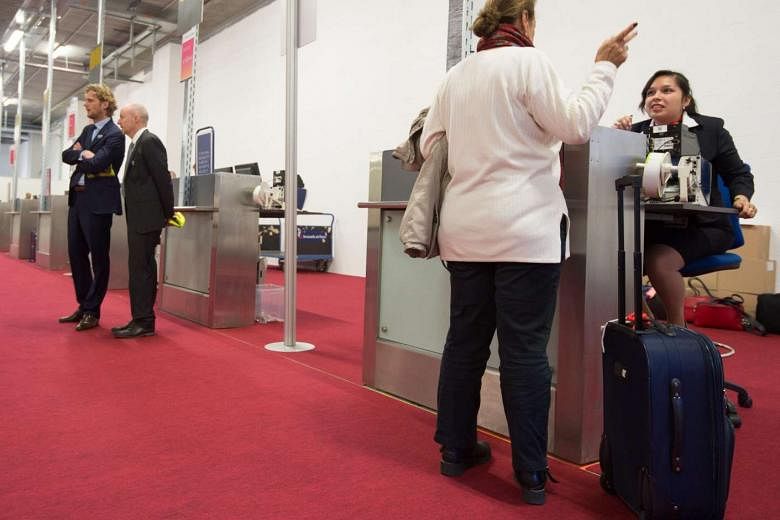BRUSSELS (Reuters, AFP) - Brussels Airport reopened Sunday (April 3) with three "symbolic" flights and strict additional checks for passengers, marking a new high-security era for air travel in Belgium after attacks by Islamic State in Iraq and Syria (ISIS) suicide bombers.
The key travel hub has been closed since two men blew themselves up in the departure hall on March 22 in coordinated blasts that also struck a metro station in the Belgian capital, killing a total of 32 people.
The attacks at the heart of Europe shocked the country and many hope the airport's reopening, even on a limited scale, will help turn the page on the traumatic events.
Heavily armed police and soldiers manned the access roads to the airport, ushering the first passengers into the large white tents serving as a temporary check-in facility, AFP reporters saw.
There was also a strong security presence inside the tents, where travellers, who have been asked to arrive three hours before their flight, walked through metal detectors and had their bags screened.
The airport's modest resumption of services began with what Brussels Airport chief executive Arnaud Feist called three "symbolic passenger flights" to the Portuguese city of Faro, Athens, and Turin in Italy.
"These flights are the first hopeful sign from an airport that is standing up straight after a cowardly attack," Arnaud Feist said on the eve of the restart.
The same planes were to fly back to Brussels with passengers later Sunday. The first flight was to depart for Faro at 1140 GMT (7.30 pm Singapore time).
Loukas Bassoukos, a 20-year-old IT student who arrived early for his flight to Athens later Sunday, said it felt "a bit weird" to be among the first to return to the airport.
"So many people died here," he told AFP. "But I think we can overcome this. I think we slowly have to start trusting the security controls."
Under the new system, only passengers with tickets and ID documents are allowed into the makeshift departure hall, and all bags will be checked before entering. Once inside, travellers will still have to go past the usual security barriers.
Zaventem airport will initially only be accessible by car, with no access for buses and trains. Vehicles will be screened and subject to spot checks. Special cameras will be set up to read number plates, and the drop-off zone will not be accessible.
The number of flights will be stepped up gradually, although the airport will only be able to work at 20 per cent capacity at best using the temporary facilities, handling 800 to 1,000 passengers an hour. It will take months to repair the departure hall, according to Feist.
The damage from the blasts was severe, with images from the scene showing the building's glass-fronted facade in shatters, collapsed ceilings and destroyed check-in desks. Feist said he expected the airport to start running normally again from late June or early July "before the start of the summer holidays".
The closure of Zaventem airport has wreaked havoc on the travel industry, triggering a drop in tourist arrivals and forcing thousands of passengers to be rerouted to other airports in and around Belgium.
Brussels Airport, which claims it contributes some 3 billion euros annually to the Belgian economy, has not released any figures on the economic impact of the shutdown, but top carrier Brussels Airlines, which is 45 per cent owned by Germany's Lufthansa, has said it has been losing 5 million euros (S$7.69 million) daily.
With 260 companies on-site employing some 20,000 staff overall, the airport is one of the country's largest employers.
The airport is one of the largest in Europe, handling 23.5 million passengers per year. It links the Belgian capital, headquarter city of the European Union and Nato, with 226 destinations worldwide through 77 airlines.
With its temporary check-in zone, it will only be able to handle some 800 departing passengers or about five to six flights per hour, around 20 per cent of previous capacity.
Hotel reservations in the capital have fallen by 50 per cent since March 22, the Brussels Hotels Association said. Belgium's tourist industry was already suffering from the aftermath of ISIS attacks in Paris last November, which killed 130 people.
Several of the Paris attackers had links to Brussels and the city went into lockdown for several days after the carnage in neighbouring France, with security forces fearing an imminent attack.
The sole surviving Paris suspect, Salah Abdeslam, was arrested in Brussels on March 18, just four days before the Brussels killings. He denies having any prior knowledge of the attacks in the Belgian capital, although investigators have uncovered links with two of the bombers. Belgian police are still hunting for a mystery third suspect, dubbed "the man in the hat", who was seen in CCTV footage next to the two airport bombers.
On Monday (April 4), the airport will serve a far wider range of destinations, including one plane also due out to New York and two more to cities in Cameroon, Gambia and Senegal.
Many flights have been rerouted to Belgium's regional airports or other nearby hubs such as Amsterdam and Paris, with high-speed trains to and from Brussels packed.




